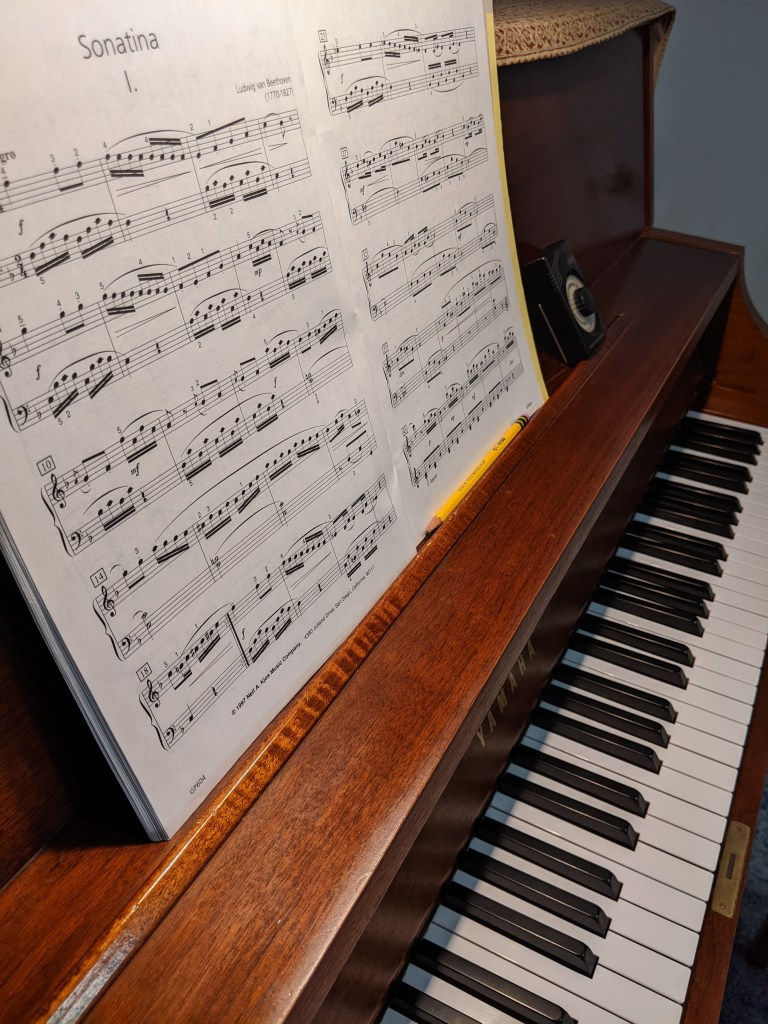Expect Backsteps in the Dance of Life
- Catherine Sipher

- May 10, 2023
- 4 min read
When experiencing growth or life changes, setbacks should be expected as you transition and expand.
"Changing the left hand made the right hand harder."
One of my students made this statement during their piano lesson. On the surface, the statement is simple and straightforward. However, as I instructed him through the passage I saw deeper insights and life lessons to be learned from his observations.
Learning T0 Waltz
Carter, an advanced beginning student, had accurately learned a piece of music in a ¾ time signature for both hands in the G-hand position.
With only three beats in a measure instead of four, this time signature can be challenging for students to master. Different from playing in 4/4, where the first and third beats receive emphasis (think of a marching band walking in a parade), the ¾ time signature requires the emphasis to be placed only on the first of three beats. (Imagine a colonial ballroom scene with participants dancing to a waltz with the count of “1 2 3 1 2 3”.)
Though Carter played the song accurately, his performance didn’t quite have the lilting quality of the time signature. After a little instruction and demonstration of the desired style, I ask him to play the left hand alone, bringing more of an accent to the first beats. He played it brilliantly. After a few tries with the left-hand accompaniment by itself, Carter added the right-hand melody. That's when the trouble started.
"Changing the left hand made the right hand harder."

Discovering An Imbalance
He was absolutely correct. That one little shift in playing brought an imbalance into Carter’s playing because I asked him to do something different than he had consistently practiced all week. To perform the piece in a new way, he had to break the habits he had well established through consistent home practice. Now Carter’s task was to rewire his brain and fingers to approach playing the keys in a new way. As he made shifts to the left hand, his right hand was also impacted because the two hands, though independent, must operate collaboratively to create the music. In short, the way he approached the right-hand passage was impacted by the changes being made in his left hand.
As frustrating as it can be for the student, this “backstep” is a common and expected part of learning how to play an instrument. In fact, if you were to observe a lesson at almost any music studio, you would witness the infamous "backstep."
I sympathized with the student. "When making small changes to what was learned, expect other areas to change as well. We need time to recalibrate to the new way of being and doing."
As I said that, I stopped in my tracks. How often do I become frustrated with myself for the setbacks that often occur when introducing change into my life?
Expect Backsteps
When my life changes, even slightly, I almost always experience setbacks of various kinds. Usually, my nutrition, exercise, or piano-practicing habits slip a little. These shifts cause me to reexamine my life, my priorities, and my habits and make clear decisions about how to move forward.
For you, it might be a new daily routine, a new responsibility, a change to the daily schedule, a new work responsibility, or a new way of exercising or eating that is creating an imbalance in your life. The variations are endless in a world and life that is ever-changing.
Whatever the change may be, I must expect other areas of my life to shift or even “backstep” as I recalibrate and readjust to the new normal and the growth I'm experiencing in that particular area of my life.

Embracing the Backstep
Life is a dance. “Two steps forward, one step back,” some people say.
What if we remove the expectation of constant forward momentum in our lives and instead view these transitions as moments to recalibrate and readjust? As we gather more information and assimilate the changes into our living, we can expect a shift in the dance to the left or to the right. Sometimes these newfound insights might even call for a spin or a half-turn.
Wherever they take us, perhaps we are best served when we observe the imbalances, take them in without judgment, and remain alive to the true beauty of the dance.
Oh, and my student? With more practice, Carter mastered the pulse, the accents, AND the correct right-hand notes. They are a rockstar in my book!
Food for Thought:
What is one way you can begin to anticipate, expect, and welcome “backsteps” into your ever-changing life?
Envision what it would feel like to embrace the process of learning, relearning, and changing with acceptance. Would you feel freer? Less frustrated? More eager to learn more?
I encourage you to not be surprised or discouraged by the imbalances that accompany change. See them as gifts to your personal growth as you get to know yourself better through these kinds of changes.
If you want to extend the dance of life to the piano keys in your home, I would be honored to teach you the art of playing the piano.
It is my true honor to bring the joy of music into hearts and home through personalized remote piano lessons that will leave you feeling supported and accomplished (and perhaps even dancing).
The process is simple:
1. Schedule a call to talk about your goals.
2. Select a lesson time.
3. Take your first lesson!
To have these "Insights From The Piano Bench" essays land directly in your inbox, subscribe to my monthly blog digest newsletter. Let's explore what music can teach us about life together.




Comments